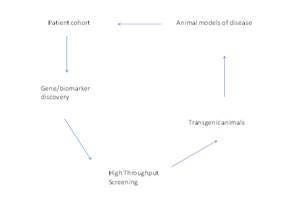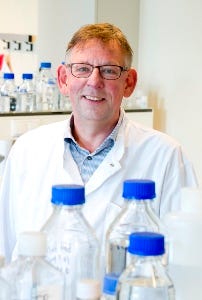Molecular and cellular biology
Molecular and cellular biology
Our research uitklapper, klik om te openen

In Molecular and cellular biology, traditional research is dedicated to:
1) unravel acute functional relevance of individual proteins-SNPs-genes, including biomarkers as well as
2) mechanistic insights into their long term role in signal transduction – gene expression is the focus of the studies performed.
For this purpose, a closed circle consisting of 5 key methodology sections is relevant:
In this research area, several lines of research can be identified: uitklapper, klik om te openen
1. Thrombosis and coagulation: III-4: Profs de Groot and Van Solingen
Pi’s: Fijnhaar, Roest, Schutgens and Urbanus ,
Schiffelers
Platelets in hemostasis, thrombosis, atherosclerosis, and infectious disease. Microparticles, phage display, anti-phospholipids including animal models, platelets and vascular wall interaction, Von Willebrand factor and hemophilia. Biacore and ELISAs.
2. Atherosclerosis/Angiogenesis III-2: group Höfer (Pasterkamp) and Vink
The effects of hypoxia on cells and tissue. Angiogenesis: development and growth of collateral arteries, transgenic mouse models, laser Doppler perfusion imaging, pigs with coronary occlusion.
3. Heart and Renal failure III-3: group de Kleijn / Doevendans / Vos
Pi’s: Sluijter, van Veen, de Weger and Goldschmeding
Myocardial ischemia/reperfusion and the role of Exosomes, Fibronectin EDA, and Toll-like receptors in the size of the infarct. Animal models (transgenic mouse and pig) of ischemia/reperfusion. microRNAs in modulation of gene expression and repair.
4. Arrhythmias-Electrophysiology III-5: Prof Vos and Hauer
Pi’s: van Veen, Meine, van der Heyden, Loh, van Rijen
Intact animal models of compensated hypertrophy and heart failure (dog, rabbit, rat and mouse), mapping of isolated hearts, cellular electrophysiology on native myocytes and cell lines, hES and iPS cells, and signaling. Arrhythmias related to repolarization and conduction (gap junctions and fibrosis) are studied. New risk stratifying techniques developed.
5. Stroke III-1: (Rinkel) and Post
Schiffelers
Development of aneurysms due to changes in vessel wall composition. Electron microscopy of endothelial cells.
In molecular and cellular biology, traditional research is dedicated to unravel acute functional relevance of proteins and genes, as well as mechanistic insights into their long-term role in signal transduction. Functional relevance of proteins-methodologies for the prevention, prediction and prognosis of atherosclerosis (aneurysms, angiogenesis, and platelets), heart failure and arrhythmias is the mission. An optimal interaction between data gathered in clinical cohorts and validated in applied research is the cornerstone of translational research.
key publications uitklapper, klik om te openen
Harakalova M, van Harssel JJ, Terhal PA, van Lieshout S, Duran K, Renkens I, Amor DJ, Wilson LC, Kirk EP, Turner CL, Shears D, Garcia-Minaur S, Lees MM, Ross A, Venselaar H, Vriend G, Takanari H, Rook MB, van der Heyden MA, Asselbergs FW, Breur HM, Swinkels ME, Scurr IJ, Smithson SF, Knoers NV, van der Smagt JJ, Nijman IJ, Kloosterman WP, van Haelst MM, van Haaften G, Cuppen E. Dominant missense mutations in ABCC9 cause Cantú syndrome. Nat Genet. 2012 May 18;44(7):793-6. doi: 10.1038/ng.2324.
principal investigators uitklapper, klik om te openen

coordinator
Prof. M.A. Vos
PIs
Post, Rinkel, Bleys, Giles, Hoefer, Kalkhoven, de Kleijn, Pasterkamp, Vink, Fijnheer, de Groot, Roest, Schutgens, van Solingen, Urbanus, Doevendans, van der Heyden, Sluijter, van Veen, de Weger, Loh, Meine, van Rijen, Goldschmeding, Schiffelers.

